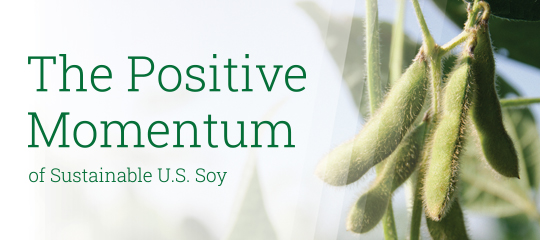
ST. LOUIS, MO – April 2, 2024 -The U.S. Soy Sustainability Assurance Protocol (SSAP) has released The Positive Momentum of Sustainable U.S. Soy, a comprehensive sustainability report on the 10-year history and growth of international U.S. Soy shipments verified by the SSAP.
The SSAP is a tool that aggregates sustainability and conservation principles to verify sustainable soy production on U.S. soybean farms. It was created in 2014 to provide credible information and assurance to U.S. Soy customers that the soy they purchase is sustainably produced.
“The U.S. Soy supply chain and its customers share a desire to understand one another and work together for sustainable solutions,” said Jim Sutter, USSEC CEO. “This communication and partnership is driving the ever-increasing demand and momentum for sustainable U.S. Soy.”
In 2023, a record 44,480,427 metric tons – 70% of all U.S. Soy exports – were shipped with an SSAP certificate, a 56.44% increase in SSAP shipments over 2021.1 U.S. Soy’s carbon footprint is the lowest in the world when factoring in cultivation impact and land-use change versus other soy, plant proteins and vegetable oils.2
Consumer-facing packaging labels verifying that products are made with “Sustainable U.S. Soy” (SUSS) or “Fed with Sustainable U.S. Soy” are also seeing an increase in use worldwide. More than 1,000 products in countries across the globe currently feature licensed SUSS labels.
“Sustainability is not just a trend but something that creates long-term value for companies,” said Chulhoon Lee, Purchasing Manager for Sajo Daerim Corporation in Seoul, Korea. “We know that using the “Sustainable U.S. Soy” logo is a great opportunity to demonstrate our commitment to sustainability.”
The 2023 SSAP report also highlights sustainability milestones achieved by U.S. soybean farmers, successful industry collaborations, and progress toward U.S. Soy’s 2025 sustainability goals*, which include:
- Reduction in land use impact by 10%
- Reduction in soil erosion by 25%
- Increased energy efficiency by 10%
- Reduction in total greenhouse gas emissions by 10%
*2025 sustainability goals use the year 2000 as a starting benchmark.
This press release was funded in part by the soy checkoff.
Editor’s note: INTERVIEW OPPORTUNITY
For more insight to the 2023 SSAP Report and positive impact of sustainable U.S. soybean farming practices, USSEC Director of Sustainability, Abby Rinne, USSEC CEO Jim Sutter, and U.S. soybean farmers are available for interviews. To schedule an interview, please contact:
Kerrey Kerr-Enskat
USSEC Senior Communications Manager
+1 (515) 823-1848, kenskat@ussec.org
Erin Worrell
USSEC Communications Manager
+1 (830) 998-4624, eworrell@ussec.org
About the U.S. Soybean Export Council (USSEC):
The U.S. Soybean Export Council (USSEC) focuses on differentiating, elevating preference, and attaining market access for the use of U.S. Soy for human consumption, aquaculture, and livestock feed in 80+ countries internationally. USSEC members represent the soy supply chain including U.S. Soy farmers, processors, commodity shippers, merchandisers, allied agribusinesses, and agricultural organizations. USSEC is funded by the U.S. soybean checkoff, USDA Foreign Agricultural Service matching funds, and industry. Visit www.ussec.org for the latest information on U.S. Soy solutions and news about USSEC and U.S. Soy internationally.